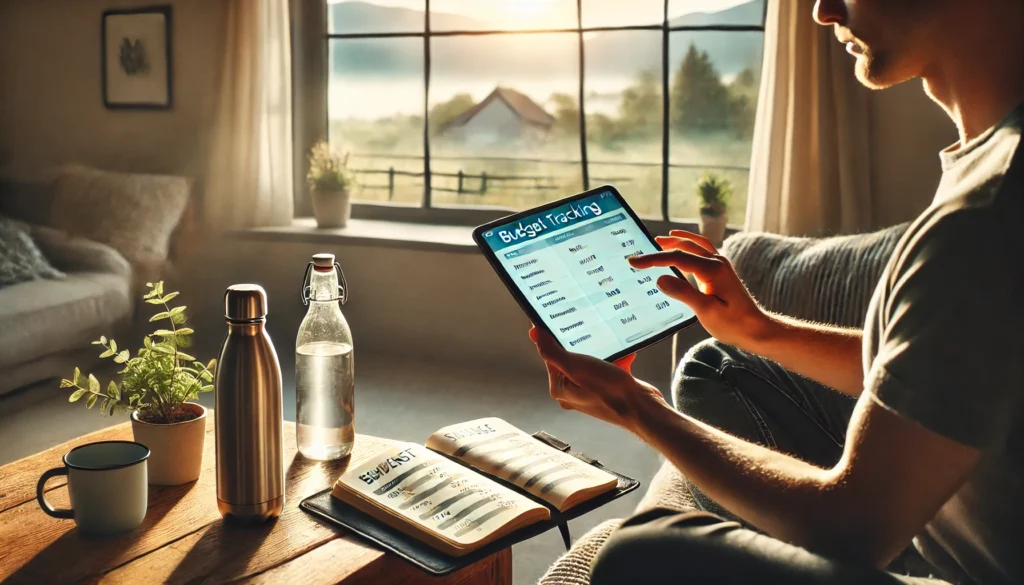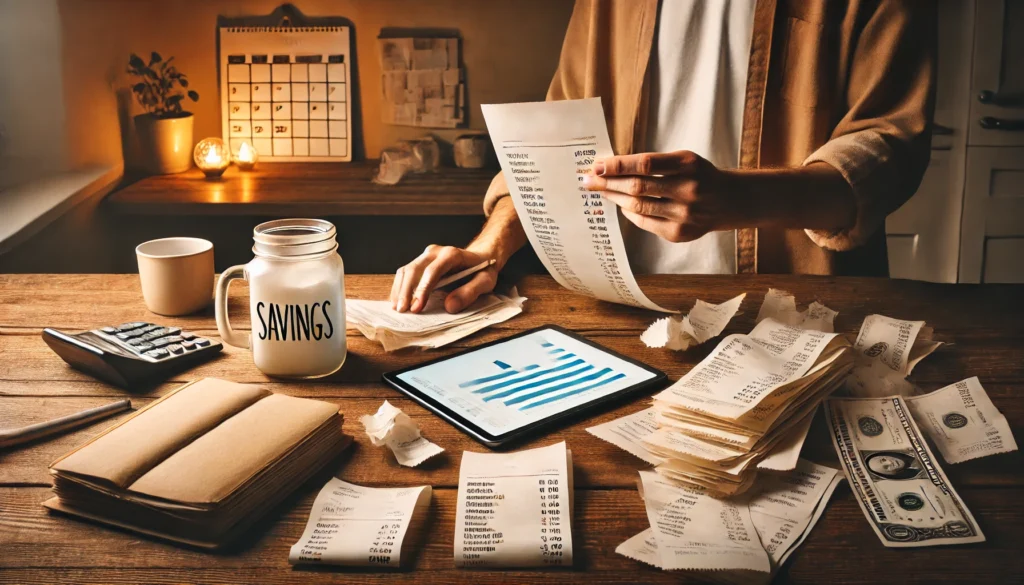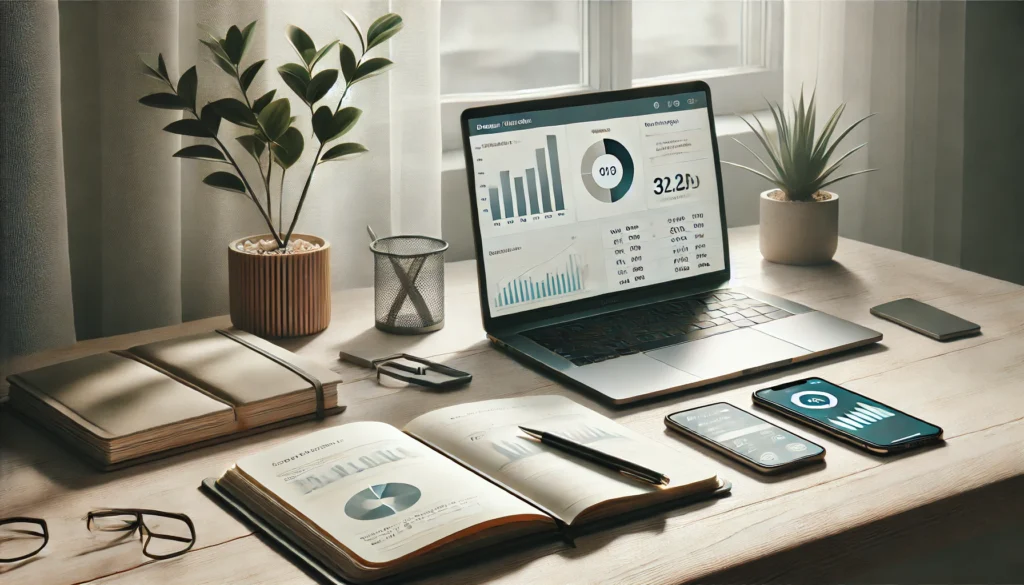Understanding the Power of Expense Tracking
Tracking expenses is one of the most powerful tools in financial management, yet many people struggle to implement it consistently. Without a clear picture of where money is going, it is easy to overspend, fall into debt, or fail to save for long-term goals. The best way to track spending is to develop a system that is both accurate and sustainable, ensuring that financial awareness becomes second nature rather than a cumbersome chore.
You may also like: 10 Genius Frugal Living Hacks: Effective Ways to Save Money on Household Bills
Expense tracking is not just about listing purchases; it is about gaining financial clarity. When you monitor spending habits regularly, you begin to identify patterns, unnecessary expenses, and areas where you can cut back. The best way to track all my money is to choose a method that aligns with daily routines and lifestyle preferences. Whether it is a digital app, a spreadsheet, or a daily spending tracker manual approach, consistency is the key to success.
By embracing a structured way to monitor expenses, individuals can make more informed financial decisions. The best way to track expenses is one that integrates seamlessly into a budgeting system. This ensures that not only are expenses recorded, but they also align with financial goals and overall financial health. Tracking expenses throughout the month prevents financial surprises, eliminates wasteful spending, and creates a foundation for sustainable money management.

Why Tracking Expenses Is Essential for Financial Success
Understanding where money is spent each month is crucial for financial success. Without careful monitoring, even the most disciplined budget can fall apart. People often wonder, “Why is tracking your expenses throughout the month important?” The answer lies in its ability to reveal financial blind spots, identify bad spending habits, and empower individuals to take control of their finances.
A budget is only as effective as its enforcement, and the best way to track finances is by ensuring that spending is monitored in real-time. Many people create budgets with good intentions, but without a system for tracking actual spending, those budgets become meaningless. How to monitor spending effectively involves selecting a system that is easy to maintain while offering enough detail to provide valuable insights.
Tracking expenses also fosters financial mindfulness. When people actively record their purchases, they become more aware of their spending decisions. This heightened awareness naturally leads to better choices, helping individuals avoid impulse purchases and unnecessary expenses. How to keep track of expenses is not just about recording numbers; it is about developing a proactive approach to money management.
By consistently monitoring expenditures, individuals gain the ability to forecast financial needs accurately. This helps in avoiding overdrafts, reducing reliance on credit, and ensuring that financial goals are met. Why is it important to track your expenses? Because financial stability is built on knowledge and informed decision-making, both of which come from diligently recording and reviewing expenses.
Choosing the Best Expense Tracking Method
There are several ways to track expenses, each with its own advantages. The best way to track spending varies depending on individual preferences, lifestyle, and financial complexity. Some prefer digital solutions, while others thrive with traditional pen-and-paper methods. Regardless of the approach, the ultimate goal is to find a system that encourages consistency and accuracy.
For those who prefer a digital-first approach, budgeting apps offer a seamless experience. These tools sync with bank accounts and categorize transactions automatically, making expense tracking nearly effortless. Some of the best budgeting apps also provide insights into spending patterns, helping users identify areas for improvement. When seeking the best way to track all my money, these digital solutions can be a game-changer, offering automation and real-time financial snapshots.
Alternatively, a daily spending tracker manual system can be equally effective, especially for individuals who appreciate a hands-on approach. Writing down expenses in a notebook or using a spreadsheet fosters a deeper connection to spending habits. This method may require more effort, but it increases financial awareness and promotes intentionality. Budget track methods that involve active participation can often lead to better financial discipline.
For individuals who prefer a hybrid approach, combining digital and manual methods can provide the best of both worlds. Utilizing an app for automatic tracking while also maintaining a handwritten log of cash transactions ensures complete financial oversight. The best way to track expenses is ultimately the one that an individual will stick with consistently, leading to better financial outcomes.
Creating a Sustainable Expense Tracking Habit
One of the biggest challenges in financial management is maintaining consistency. Many people start tracking expenses with enthusiasm but quickly abandon the habit due to complexity or lack of immediate results. How to keep track of spending successfully involves building a system that is easy to maintain and integrates naturally into daily life.
A practical approach is to set a dedicated time each day to log expenses. Whether it is first thing in the morning or before bed, making expense tracking a daily ritual ensures consistency. This habit also prevents small expenses from being forgotten, which can add up over time. Why is tracking your expenses throughout the month important? Because it allows individuals to stay ahead of financial problems rather than reacting to them after they occur.
Another key factor is making the process enjoyable. Using visually appealing expense trackers, rewarding oneself for consistency, or gamifying the process can help maintain motivation. The best way to track finances is one that does not feel like a chore but rather a beneficial part of financial wellness.
Lastly, reviewing spending trends on a weekly or monthly basis provides valuable insights. Looking back at expenses helps identify areas for improvement and ensures that budget goals are being met. How to monitor spending effectively means not only recording expenses but also reflecting on them regularly to make adjustments as needed.
The Psychological Benefits of Expense Tracking
Beyond the practical advantages, expense tracking has significant psychological benefits. Financial stress is a common issue, but knowing where money is going can provide a sense of control and security. The best way to track spending is one that alleviates financial anxiety by offering clarity and predictability.
When individuals see their financial situation laid out clearly, they can make decisions with confidence. The best way to track all my money is through a system that reduces uncertainty and provides reassurance. By knowing exactly how much is available to spend, people can make better choices, avoid financial pitfalls, and plan for future needs effectively.
Moreover, tracking expenses fosters a sense of accomplishment. Each recorded transaction represents a step toward financial awareness and responsibility. The best way to track expenses is one that reinforces positive financial behaviors, leading to long-term stability and success.

Frequently Asked Questions: Advanced Insights into Expense Tracking
1. What psychological benefits come from consistent expense tracking over time?
Engaging in consistent expense tracking not only strengthens financial awareness but also enhances a person’s sense of control and emotional resilience. When people adopt the best way to track spending—particularly methods that include reflection, such as journaling expenses—they tend to experience lower financial anxiety and a greater sense of clarity. Utilizing a daily spending tracker manual encourages mindfulness around purchases, often reducing impulsive behavior. The act of tracking creates a feedback loop that reinforces delayed gratification, which is especially helpful for long-term financial planning. This is why tracking your expenses throughout the month is important—it cultivates both fiscal responsibility and psychological calm.
2. How can digital minimalists approach expense tracking without using too many apps?
Digital minimalists often seek low-tech alternatives to manage finances, and for them, the best way to track all my money might involve analog tools such as a notebook or spreadsheet paired with routine check-ins. A daily spending tracker manual fits perfectly with this ethos, as it eliminates distractions while encouraging intentionality. When considering how to monitor spending without a digital footprint, setting aside time daily to log receipts and categorize purchases can be deeply grounding. Many who embrace minimalism find that this style of budget track deepens their relationship with money by removing algorithm-driven nudges toward spending. It’s a powerful reminder that the best way to track expenses doesn’t always require a smartphone—it just needs consistency and attention.
3. Are there cultural differences in how people track their spending habits?
Absolutely, cultural norms shape perceptions of money management, including how to keep track of expenses. In countries like Japan, for example, kakeibo is a traditional practice that blends budgeting with reflection, closely aligned with a daily spending tracker manual. Meanwhile, in parts of Scandinavia, digital transparency laws make it easier for citizens to view financial data, which influences the best way to track finances using publicly supported platforms. These international approaches highlight that the best way to track all my money may depend on social values and infrastructure. Exploring how to keep track of spending in different cultural contexts can offer fresh ideas for making personal finance more intuitive and sustainable.
4. How can couples or roommates track shared expenses more effectively?
Collaborative expense tracking introduces challenges like transparency, communication, and fair distribution. The best way to track spending in shared households often involves hybrid tools—apps that sync data, paired with regular in-person discussions. While a shared spreadsheet can act as a daily spending tracker manual, adding personal notes and comments can reduce misunderstandings. To truly optimize how to monitor spending jointly, it’s vital to clarify expectations early and revisit agreements monthly. This is why tracking your expenses throughout the month is important—it builds mutual trust and reduces tension, particularly when unexpected costs arise.
5. What role does habit stacking play in successful expense tracking?
Habit stacking—pairing a new behavior with an established one—is a proven strategy for improving consistency. For example, if you already make coffee every morning, adding five minutes of logging your receipts at the same time can make using a daily spending tracker manual effortless. Over time, this supports the best way to track expenses without adding cognitive load. People often abandon financial routines because they feel disconnected from their daily lives, so integrating budget track tasks into existing rituals increases long-term adherence. If you’re asking how to keep track of expenses sustainably, habit stacking could be the missing piece.
6. What are the long-term impacts of tracking spending on wealth accumulation?
There is a strong correlation between consistent tracking and financial growth, especially when strategies evolve with your income level. Early adopters of the best way to track finances often gain granular knowledge about cash flow, enabling smarter investment decisions. Whether using an app or a daily spending tracker manual, long-term tracking builds a data-rich history that reveals patterns, risk behavior, and areas for optimization. That depth of insight allows for better forecasting and faster achievement of goals like retirement or property ownership. So when people wonder why is it important to track your expenses, the answer is simple: the sooner you start, the more compound value you unlock.
7. How can freelancers and gig workers manage irregular income using tracking tools?
For people with variable income, the best way to track all my money involves projecting minimum earnings and overestimating recurring costs. Freelancers often find that combining a daily spending tracker manual with a rolling average of income provides a realistic view of affordability. Since income may fluctuate, the ability to budget track expenses weekly—or even daily—becomes critical for preventing cash shortfalls. Understanding how to keep track of spending also helps freelancers identify lean months and prepare accordingly. Because irregular earners can’t rely on automated deductions or stable payroll, learning how to monitor spending is not just helpful—it’s essential for survival.
8. Are there innovative tools or methods on the horizon for advanced spend tracking?
Emerging technologies like AI-driven categorization and passive tracking via bank integration are shaping the future of the best way to track spending. Some platforms now use predictive algorithms to suggest future expenses based on historical patterns, making budget track systems more proactive than reactive. There are also experimental approaches that gamify the best way to track finances, turning savings goals into virtual achievements. Even analog users benefit from modern hybrid tools that digitize data from a daily spending tracker manual for deeper analysis. The frontier of how to keep track of expenses is rapidly evolving, especially with the integration of biometric security and voice commands.
9. What overlooked spending categories should be monitored more closely?
Many people focus on large, obvious expenses but ignore the compounding cost of smaller or irregular ones. For example, subscriptions, convenience foods, and service fees often go unnoticed unless your system emphasizes how to monitor spending at a granular level. The best way to track all my money includes periodic audits of overlooked line items that drain resources quietly. A daily spending tracker manual encourages visibility into these “financial leaks,” allowing for targeted corrections. This is why tracking your expenses throughout the month is important—not just to manage known costs but to catch those that lurk in plain sight.
10. Can tracking spending improve your social relationships?
Surprisingly, yes. Openly discussing financial habits—especially when practicing the best way to track expenses—can strengthen trust among partners, friends, and even colleagues. When people are transparent about how to keep track of spending, it reduces social pressure to overspend and encourages shared responsibility in group decisions. Using a mutual budget track system can help with planning events, trips, or even casual outings more fairly. The best way to track finances isn’t just about personal control; it can reshape how people communicate and collaborate financially. In this light, understanding why is it important to track your expenses extends beyond personal benefit—it fosters healthier, more honest relationships.

Final Thoughts: Transforming Your Financial Future
The journey to financial well-being begins with awareness. The best way to track spending is to develop a system that works consistently and aligns with personal financial goals. Whether through a digital tool, a manual log, or a hybrid approach, tracking expenses ensures financial stability and empowers individuals to take control of their money.
By understanding spending habits, identifying areas for improvement, and making intentional financial decisions, anyone can transform their financial future. How to monitor spending is not just about numbers—it is about gaining the confidence and clarity needed to achieve financial success. Implementing an effective tracking system is a simple yet powerful frugal living hack that can lead to lasting financial transformation.
frugal budgeting tips, monthly expense tracking, financial awareness strategies, smart spending habits, personal finance management, best budgeting techniques, saving money effectively, manual budget tracker, expense logging methods, smart money habits, mindful spending strategies, digital expense tracking, managing personal finances, daily money tracking, best finance apps, practical budget planning, how to cut unnecessary expenses, debt-free living tips, cost-cutting techniques, financial goal setting
Further Reading:
Four ways to track your expenses
How to Track Your Monthly Expenses
The Benefits Of Expense Tracking And How You Can Do It Effectively
Legal Disclaimer
The information provided in this article is for general informational purposes only and is not intended to constitute financial, investment, legal, tax, or other professional advice. The content should not be relied upon for making any financial or investment decisions. Readers are encouraged to consult with licensed professionals, such as financial advisors, attorneys, or tax experts, to obtain personalized advice tailored to their individual circumstances. The author and publisher disclaim any liability for any actions taken or not taken based on the information provided in this article.




